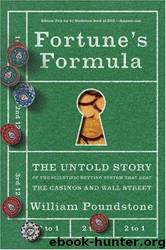Fortune's Formula by William Poundstone

Author:William Poundstone [Poundstone, William]
Language: eng
Format: epub
Tags: Business & Economics, Investments & Securities, General, Stocks, Games, Gambling, History, United States, 20th Century
ISBN: 9780809045990
Google: 9YDlaUfmhkgC
Amazon: 0809045990
Publisher: Hill and Wang
Published: 2006-09-18T23:00:00+00:00
Daniel published these words in Latin. The wager has come to be known as the “St. Petersburg wager” or “St. Petersburg paradox.” It has provoked sporadic interest ever since. A mention in John Maynard Keynes’s 1921 Treatise on Probability made it part of the mental furniture of nearly every twentieth-century economist. Bernoulli’s wager makes an appearance in von Neumann and Morgenstern’s Theory of Games and Economic Behavior and in papers by Kenneth Arrow, Milton Friedman, and Paul Samuelson.
The paradox can be resolved easily by noting that Peter would have to possess infinite wealth to make good on the game’s potential payouts. No one has infinite wealth. Therefore most of the terms of the infinite series are irrelevant. A minuscule chance of winning a quadrillion dollars is not worth what you might compute. It’s worth practically nothing because no one has a quadrillion dollars to award.
Suppose a casino offered this wager with winnings capped at a billion dollars. How much would the wager be worth then? A lot less! Assume prizes start with a dollar. Normally, the prize for heads on the 31st toss would be $1,073,741,824. The most reasonable course for the casino would be to halt the game at 30 tosses and award the billion dollars to anyone who has gotten 30 tails. The expected value of this truncated game is a measly $15.93.
That’s a lot more reasonable. The wager is not worth infinity, just a few dollars. This explanation of the puzzle is as good as any hardheaded realist could ask for. Yet philosophers, mathematicians—even economists—have rarely accepted this solution. Most take the position that we can pretend that Peter possesses infinite wealth. Isn’t it still ridiculous to say that Paul should be willing to pay any amount to play the game?
Daniel Bernoulli thought so. He proposed a different solution that was highly influential for future economic thought. Bernoulli drew a distinction between money and the value people place on money. To a billionaire, $1,000 is pocket change. To a starving beggar, $1,000 may be a fortune. The value of a financial gain (or loss) depends on the wealth of the person it affects.
You’re probably saying to yourself that you already knew that. Well okay, Bernoulli’s real contribution was to coin a word. The word has been translated into English as “utility.” It describes this subjective value people place on money. Bernoulli claimed that people instinctively act to achieve the greatest possible utility—not necessarily the greatest number of dollars or ducats. “The value of an item must not be based on its price,” Bernoulli wrote, “but rather on the utility it yields. The price of the item is dependent only on the thing itself and is the same for everyone; the utility, however, is dependent on the particular circumstances of the person making the estimate.”
How much less is a dollar worth to a rich person than a poor one? The only honest answer is, “It depends.” As an example, Bernoulli sketched the case of a rich man who is imprisoned and needs exactly 2,000 ducats more than he has in order to buy his freedom.
Download
This site does not store any files on its server. We only index and link to content provided by other sites. Please contact the content providers to delete copyright contents if any and email us, we'll remove relevant links or contents immediately.
Rich Dad Poor Dad by Robert T. Kiyosaki(6538)
Pioneering Portfolio Management by David F. Swensen(6264)
How To Win Friends and Influence People by Dale Carnegie(4476)
The Money Culture by Michael Lewis(4147)
The Dhandho Investor by Mohnish Pabrai(3731)
The Wisdom of Finance by Mihir Desai(3703)
Liar's Poker by Michael Lewis(3420)
Fooled by Randomness: The Hidden Role of Chance in Life and in the Markets by Nassim Nicholas Taleb(3084)
The ONE Thing by Gary Keller(3042)
The Intelligent Investor by Benjamin Graham Jason Zweig(3022)
Mastering Bitcoin: Programming the Open Blockchain by Andreas M. Antonopoulos(3017)
Rich Dad Poor Dad: What The Rich Teach Their Kids About Money - That The Poor And Middle Class Do Not! by Robert T. Kiyosaki(2932)
How to Day Trade for a Living: Tools, Tactics, Money Management, Discipline and Trading Psychology by Andrew Aziz(2927)
Investing For Dummies by Eric Tyson(2925)
How to Win Friends and Influence People by Dale Carnegie(2888)
The Psychology of Money by Morgan Housel(2836)
Market Wizards by Jack D. Schwager(2680)
Zero Hour by Harry S. Dent Jr. & Andrew Pancholi(2632)
How to Pay Zero Taxes, 2018 by Jeff A. Schnepper(2626)
